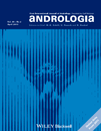Investigation of mutations in the synaptonemal complex protein 3 (SYCP3) gene among azoospermic infertile male patients in the Turkish population
Summary
To investigate possible mutations and/or single nucleotide polymorphisms in the synaptonemal complex protein 3 (SYCP3) gene among nonobstructive azoospermic infertile males in a Turkish population, 75 nonobstructive azoospermic infertile male patients were included in the study. These patients were unrelated to each other and had 46,XY chromosome structure without Y microdeletion. In addition, 75 individuals whose fertility was proven by reproduction were enrolled in the study as controls. Nine exon deep intronic primers belonging to the SYCP3 gene were designed and amplified by PCR, and the nucleotide sequences were identified by DNA sequence analysis. DNA sequence analysis was used to detect mutations and/or single nucleotide polymorphisms in the SYCP3 gene. No mutations were detected in the 9 exons of SYCP3. A total of eleven variations, however, were detected: seven have been identified in the NCBI SNP database, whereas four have not. On the basis of the results, we agree with the idea that SYCP3 mutations are not associated with the genetic susceptibility for meiotic arrest in infertile male patients with nonobstructive azoospermia in the Turkish population and that further studies investigating the other components of the synaptonemal complex protein (SYCP1, SYCP2) should be conducted.




